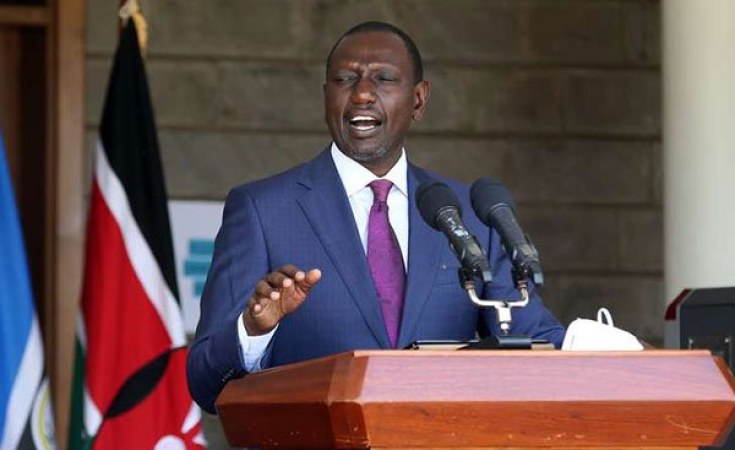Kenya President co-opts opposition heavyweights into cabinet
Kenyan President William Ruto on Wednesday named four heavyweight opposition politicians to join a “broad-based” cabinet in the wake of more than a month of anti-government protests. Ruto announced the names of 10 ministers to be part of a re-formed cabinet, including four who are close to veteran opposition leader Raila Odinga, after a list […]

Mr William Ruto
Kenyan President William Ruto on Wednesday named four heavyweight opposition politicians to join a “broad-based” cabinet in the wake of more than a month of anti-government protests.
Ruto announced the names of 10 ministers to be part of a re-formed cabinet, including four who are close to veteran opposition leader Raila Odinga, after a list of another 10 was submitted to parliament on Tuesday.
The embattled president had sacked almost his entire 22-person cabinet on July 11, and announced a new partial lineup on July 19 although it included some dismissed ministers to the annoyance of many protesters.
Five of those named Wednesday were also members of the dismissed cabinet.
- Gatemen, housemaids, drivers entitled to N70,000 minimum wage –Akpabio
- FG slashes allowances of stranded Nigerians on scholarship in Russia
Ruto has pledged to form a national unity government, one of several measures to try to ease the worst crisis of his near-two year presidency.
“I commend the leadership of diverse organisations, both in public and private sectors, including political parties, for the encouraging response to my outreach to consult on forming a broad based government,” Ruto said on Wednesday.
“Their willingness to set aside partisan positions and interests in order to join a visionary partnership for the radical transformation of Kenya is a historic gesture of their patriotism.”
The cabinet nominations must be approved by parliament.
The four opposition nominees are John Mbadi, who was named to the treasury, James Opiyo Wandayi for energy, Ali Joho to the mining ministry and Wycliffe Oparanya as head of the cooperatives ministry.
All four are leading figures in Odinga’s Orange Democratic Movement (ODM), the main party in the Azimio opposition coalition.
Ruto, Kenya’s former deputy president, rose to the top job in a narrow election victory nearly two years ago over Odinga, who claimed the vote was “stolen”.
‘Political cannibalism’
Ruto’s plans for a broad-based government have split Azimio, with his former running mate Kalonzo Musyoka declaring on Friday they will not support such an administration.
“This is a betrayal of the Kenyan people, particularly Gen Z and millenials, who have paid the ultimate price to rid this country of the disastrous Kenya Kwanza regime, their harsh taxes, corruption, tribalism, unemployment and the continued high cost of living,” said Musyoko.
James Orengo, Odinga’s lawyer and governor of his region, also blasted Odinga’s decision to ally with Ruto, saying it was an “absolute treachery and an act of political cannibalism”.
“Even hyenas are not as bloodthirsty to eat the dead,” he said on social media.
Since late June, Ruto has undertaken a series of measures to try to contain the recent protests that spiralled into deadly violence and morphed into wider anger against his government.
He scrapped deeply unpopular tax increases and pledged cuts to what many see as lavish government spending.
But the rallies have continued across the country under the hashtag #RutoMustGo, with disgruntled activists also seeking action against corruption and alleged police brutality.
At least 50 people have been killed and more than 400 wounded since the start of the protests on June 18, according to rights groups.
East Africa’s largest economy has been struggling with a cost of living crisis and weakening currency, with Ruto’s administration pushing for higher taxes to increase revenues in a bid to reduce public debt standing at $78 billion, according to treasury records.
Corruption and state extravagance also remain entrenched.
